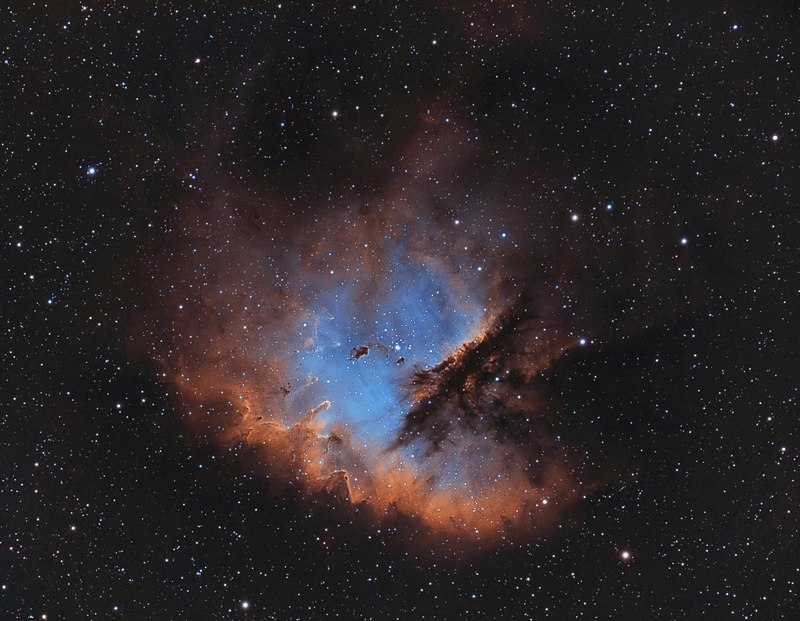THE SOUTHWORTH PLANETARIUM
70 Falmouth Street Portland, Maine 04103
(207) 780-4249 usm.maine.edu/planet
43.6667° N 70.2667° W
Altitude: 10 feet below sea level
Founded January 1970
2021-2022: LXIV
"I used to think I was indecisive, but now I'm not so sure."
THE DAILY ASTRONOMER
Thursday, January 13, 2022
The Pac-Man Nebula
And there it was poised high above us.
Front and center.
Suitable for framing.
Unutterably resplendent.
Larger than life.
"It is a mistake, ladies and gentlemen, to regard the sky as an inky black tapestry dotted by stars. To perceive the sky in this way is akin to believing that a human being is just bones and ligaments. The Universe is exuberantly alive with color. Our tendency to believe otherwise attests to our own bodily limitations. The eye cannot detect color at low light levels, hence the appearance of non-descript white stars. We were able to shuffle off this Earthly coil and embark on an excursion through the cosmos, we would behold an array of beguiling nebulae, clusters and galaxies that would stagger even the most fecund imagination. Compelling evidence that our Universe, dismissed by many as a collection of airy nothings within a soulless vacuum, is in fact the most consummate of artists, one both driven by an unslakable passion for creation and gifted with an inexhaustible reservoir of colors.
"And that brings us neatly to the Pac-Man nebula seen above us on the dome.

"Instead of scurrying frantically around a ghost-infested labyrinth, this Pac-man loiters about the Perseus Spiral Arm, about 9,200 light years from Earth, within the direction of the circumpolar constellation Cassiopeia. Known as NGC 281 in astronomical accounting departments, this Pac-man is a gorgeous emission nebula. These nebulae are so named because they absorb high energy photons from proximate or embedded stars and re-radiate that energy along a variety of wavelengths. The Great Nebula in Orion's sword is one of the most famous examples."
"Discovered in 1883 by Edward Emerson Barnard, who's the namesake of Barnard's Star, the one which exhibits the highest proper motion of any star in our sky, this nebula would disappoint you if you observed it telescopically. The vibrant colors are visible only in a time-exposure photograph. Such exposures collect a sufficient amount of light so as to allow the hues to become distinctive.These colors are indicative of the elements present within the nebula: hydrogen, helium, oxygen and others. A beautiful blend of rarefied gasses that will often coalesce to form stars in the remote future.
"Remember also the grand sizes of these structures. This Pac-Man is nearly 100 light years across. To give you an idea about that size, one will find about 1,400 star systems within that amount of space in our part of the galaxy. Look up again at the dome above; the next time you see the ancient constellation Cassiopeia, recall that it harbors this immense cloud bristling with energy and color. Whenever you look at any constellation, from the Grand Orion to the minuscule Vulpecula, be aware of the artistry contained within and well outside our view. From the Witch Head Nebula, which resembles a laughing crone in profile, to a galaxy shaped like a cigar and even to Pac-Man, himself. Tell me the cosmos isn't prodigiously creative. Any questions? Yes, over there."
"Yeah, like, what is Pac-man?"
"I'm not old!"
To subscribe or unsubscribe from the Daily Astronomer: